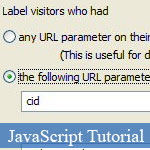 In this JavaScript tutorial article, the author shows you 2 JavaScript solutions (small JavaScript codes) to get current JavaScript URL parameters. They're very easy to try and use, let check them by yourself.
In this JavaScript tutorial article, the author shows you 2 JavaScript solutions (small JavaScript codes) to get current JavaScript URL parameters. They're very easy to try and use, let check them by yourself.
Perhaps you would like to check more our JavaScript tutorials:
- Current Document URL Displayer
- Obtaining the URL of the Referring Document
- Demo
- Enlarge
- Reload
- New window
Free iPage Web Hosting for First Year NOW
If you're still looking for a reliable web host provider with affordable rates, why you don't take a little of time to try iPage, only with $1.89/month, included $500+ Free Extra Credits for the payment of 24 months ($45)?
Over 1,000,000+ existisng customers can not be wrong, definitely you're not, too! More important, when you register the web hosting at iPage through our link, we're going to be happy for resending a full refund to you. That's awesome! You should try iPage web hosting for FREE now! And contact us for anything you need to know about iPage.
I found 2 simple solutions to reading GET variables with JavaScript.
They use either 'document.location' or 'window.location.href' to ready the URL and split it.
The first example I found here:
01.function getURLVar(urlVarName) {02. //divide the URL in half at the '?'03. var urlHalves = String(document.location).split('?');04. var urlVarValue = '';05. if(urlHalves[1])06. {07. //load all the name/value pairs into an array08. var urlVars = urlHalves[1].split('&');09. //loop over the list, and find the specified url variable10. for(i=0; i<=(urlVars.length); i++)11. {12. if(urlVars[i])13. {14. //load the name/value pair into an array15. var urlVarPair = urlVars[i].split('=');16. if (urlVarPair[0] && urlVarPair[0] == urlVarName)17. {18. //I found a variable that matches, load it's value into the return variable19. urlVarValue = urlVarPair[1];20. }21. }22. }23. }24. return urlVarValue;25.}26. 27.document.write('name = ' + getURLVar('name'));The 2nd I found here. This one is a bit more simple.
01.function getUrlVars()02.{03. var vars = [], hash;04. var hashes = window.location.href.slice(window.location.href.indexOf('?') + 1).split('&');05. for(var i = 0; i < hashes.length; i++)06. {07. hash = hashes[i].split('=');08. vars.push(hash[0]);09. vars[hash[0]] = hash[1];10. }11. return vars;12.}13. 14.var getvars = getUrlVars();15. 16.document.write('name = ' + getvars['name']);I don't really like this solution because you get 'undefined' if you select a variable that does not exist. But that may be what you want to see if a variable is present in the URL.
I simplified the first example using the slice/split idea from the 2nd example and came up with a better solution:
01.function getURLVar(urlVarName) {02. var urlVars = window.location.href.slice(window.location.href.indexOf('?') + 1).split('&');03. for(i=0; i<=(urlVars.length); i++)04. {05. if(urlVars[i])06. {07. var urlVarPair = urlVars[i].split('=');08. if (urlVarPair[0] && urlVarPair[0] == urlVarName)09. {10. return urlVarPair[1];11. }12. }13. }14. return ""; // Remove this if you want it to return 'undefined' when a variable does not exist in the URL.15.}16. 17.document.write('name = ' + getURLVar('name'));- Sent (0)
- New
Save up to 630$ when buy new iPhone 15
GateIO.gomymobi.com
Free Airdrops to Claim, Share Up to $150,000 per Project
https://tooly.win
Open tool hub for free to use by any one for every one with hundreds of tools
chatGPTaz.com, chatGPT4.win, chatGPT2.fun, re-chatGPT.com
Talk to ChatGPT by your mother language
Dall-E-OpenAI.com
Generate creative images automatically with AI
AIVideo-App.com
Render creative video automatically with AI






 20/12/2010
20/12/2010 1
1

Reply